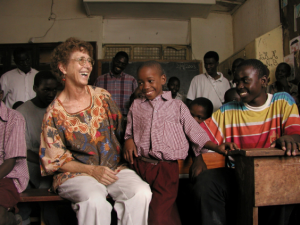Street children are seen by the community as hooligans or ruffians and are to be avoided. Some see vulnerable children as orphans the result of their parents misconduct as they died of HIV/AIDS. Consequently they are not given the opportunity to live and act as children. The vulnerable youth are always mistaken for petty thieves and people who cannot be trusted. Children over time begin to identify with the projections of the community losing in the process their self dignity. This in general affects their self esteem even after being reintegrated back into the community.
Recently a street child who was participating in class under a tree stole a tap from one man’s compound in order to sell it to get food. This boy is the product from a relationship between a father and daughter. From birth this boy was an outcast. He was sent far away to relatives who could not accept him. The community seemed to know his history and even in school he was ostracized. He felt he had no other option but to go to the streets to find his future. The old man suspected that the tap was stolen by a street boy. He was aware of a group of such children who gathered nearby under a large tree. Enraged at the loss of his water tap he found the group he had observed under the tree. He accused the teacher for keeping thieves. It took several days and a return visit by the “thief of his water tab” to soften his heart. The teacher made the first approach and explained the history of the boy who had taken his water tap. The boy was allowed to approach and ask forgiveness. The old man was so touched by the boy and his story that he found a place for the boys to sleep securely at night and gave them some small monies in exchange for chores around his compound. And we see here how whole communities need to be educated about the vulnerable children in their midst seeking only to survive. Communities when educated and informed on the plight of vulnerable children can make the children thrive.
How are we helping….
Sister Jean Pruitt, pictured above, founded The DogoDogo Centr nearly 25 years ago. Dogodogo’s vision is of a Tanzania in which all children are empowered to enjoy their basic rights to survival, development, protection and participation in society.
The word “Dogodogo” is translated from Swahili meaning “young ones”.
http://www.dogodogocentre.com/en/

